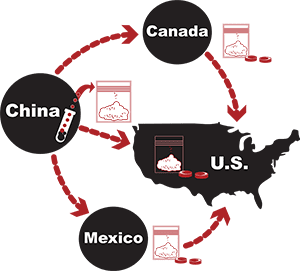First Three Members Of Elmira, New York Counterfeit Fentanyl Pill Ring Sentenced

Not sure how illicit fentanyl gets into the U.S. and counterfeit pills? Click here and read PSM’s Fentanyl 101
The first three of sixteen defendants convicted for their roles in a large-scale counterfeit fentanyl pill manufacturing and distribution ring based in Elmira, New York recently received their federal prison sentences. WENY News first reported that ringleader Robert Ian Thatcher received a 23-year prison sentence. Several days later, the news broke that Edward Barrett received seven and one-half years while Dusty Pemberton received approximately five and one-half years. Prosecutors stated that Barrett and Pemberton were “street-level” dealers of the fake pills.
In the plea agreement filed in federal court in October 2018, Thatcher admitted that starting in 2015 until May 2017 he and other members of the conspiracy used fentanyl and U-47700, a novel synthetic opioid, purchased from manufacturers in China to make counterfeit Percocet pills, which they sold in the greater Elmira, New York area as well as in Charlotte, North Carolina. Thatcher and co-conspirator Maximillian Sams purchased equipment and materials including pill presses and powdered food coloring, which they used to manufacture tens of thousands of pills.
According to prosecutors, a 21-year-old woman and a 25-year-old man are known to have died after taking the pills manufactured and sold by this pill ring. A third individual overdosed on more than one occasion but is alive because first responders administered naloxone. The ring used multiple addresses around Elmira to receive packages of illicit powders and press the counterfeit pills. Thatcher estimated that his drug ring used seven kilograms of fentanyl and one kilogram of U-47700 in the manufacturing of counterfeit pills. If all the counterfeit pills contained one milligram of fentanyl, this much fentanyl could produce seven million pills.
In a press release from the U.S. Department of Justice, U.S. Attorney James P. Kennedy, Jr. said, “That the members of this organization sought to profit by pushing poison on those struggling with addiction, is reprehensible. In my view, however, what is even more insidious about their behavior was their efforts to press this poison into counterfeit pills, thereby given their customers a false sense of security that there was some quality and dosage control associated with their manufacture.”
The U.S. Drug Enforcement Administration, the New York State Police – Community Narcotics Enforcement Team Southern Tier, the Elmira Police Department, Homeland Security Investigations, the Bureau of Alcohol, Tobacco, Firearms and Explosives, the Pennsylvania State Police, the Chemung County Sheriff’s Office, the Iredell, NC County Sheriff’s Office, and Customs and Border Protection Air and Marine Unit all contributed to the investigation that made this case possible.